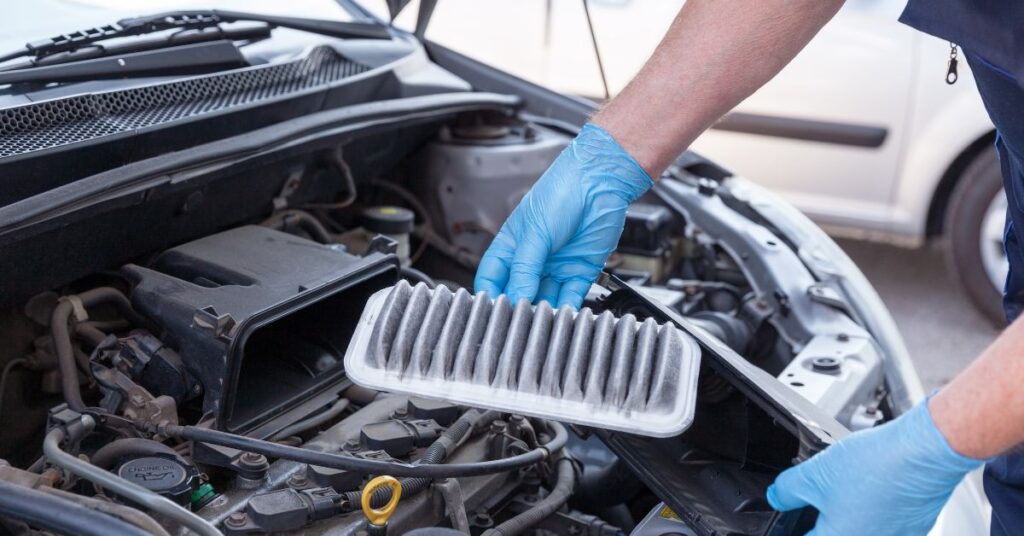
Table of Contents
Cars utilize an array of filters to keep contaminants at bay and ensure the efficient functioning of vital systems. Specifically, these filters come into play where there’s a flow of air or fluids. Many people know that their car uses air filters, but many don’t realize that there are two distinct types of air filters at work. Let’s explore the roles and distinctions between engine air filters and cabin air filters.
What Does an Engine Air Filter Do?
Depending on your vehicle’s specifications, engine air filters can come in different shapes, including round, conical, or even panel-shaped. Positioned typically towards the engine’s front and sheltered under the hood, these filters are encased in housing with an opening large enough to allow the engine to pull in substantial air. But why not leave the filter entirely exposed? Well, if it were, it would rapidly accumulate dirt, rendering it inefficient.
The primary duty of the engine air filter is to safeguard the engine by filtering out debris and even minute particles such as dust. Since engines operate at extremely high speeds, in tight clearances, and under sweltering temperatures, even a speck of dirt can potentially result in severe wear and damage to crucial components. Over time, this filter will accumulate dirt and need cleaning or a complete replacement. Ignoring a dirty engine air filter can lead to decreased vehicle performance, augmented fuel consumption, and heightened emissions.
What Does a Cabin Air Filter Do?
On the other hand, cabin air filters predominantly have a panel shape and are housed beneath the dashboard, often on the passenger’s side. Their mission is not to protect your engine but to ensure your comfort and well-being inside the car. Positioned between the outer environment and your vehicle’s interior, these filters play a pivotal role in filtering out not only debris but also allergens, mold spores, and even engine exhaust fumes. While they may not influence your car’s performance, they significantly impact the air quality inside, and neglecting them can lead to unpleasant odors, allergic reactions, and even headaches for the occupants. Essentially, the cabin air filter makes the air passengers breathe inside the car safe.
McCullough NAPA Auto Care Can Change Your Filters For You
Switching out these filters regularly can significantly improve your vehicle’s performance and driving experience. While the engine air filter is generally more accessible and can sometimes be reached without tools (just a few latches to undo), the cabin air filter might require you to get a bit more hands-on, perhaps even removing a few bolts underneath the dashboard. Don’t fret; your owner’s manual will guide you through the process.
Ensuring both these filters are inspected during any yearly tune-up is essential. If any of the issues mentioned above sound familiar, it’s likely time for a change. Remember, if you’re driving in particularly dusty or dirty conditions, the engine and cabin air filters might need attention more often than your manual suggests. Keeping them pristine is beneficial and easy, especially with professionals like McCullough NAPA Auto Care in Sandy Springs, Georgia. Our team is ready to assist you in changing out these air filters, and we can easily change them for you during your next oil change.
FAQ About Engine and Cabin Air Filters
Absolutely! A clean engine air filter ensures optimal airflow, better engine performance, improved fuel efficiency, and reduced emissions.
Symptoms include decreased fuel efficiency, reduced horsepower, unusual engine sounds, and an illuminated check engine light. A dirty filter restricts airflow, making the engine work harder.
An engine air filter improves engine performance, fuel efficiency, and reduces harmful emissions. It also protects the engine from harmful debris, prolonging its lifespan.
Neglecting the cabin air filter can lead to reduced air circulation, unpleasant odors, increased allergens, and reduced efficiency of the HVAC system in the vehicle.
Yes, a dirty cabin filter can reduce the efficiency of the AC system, leading to weaker airflow and longer times to cool or heat the cabin. It can also strain the HVAC system.
Generally, it’s recommended to change the cabin air filter every 12,000 to 15,000 miles, but it’s always best to consult the vehicle’s owner’s manual or seek advice from professionals like those at McCullough NAPA Auto Care.

